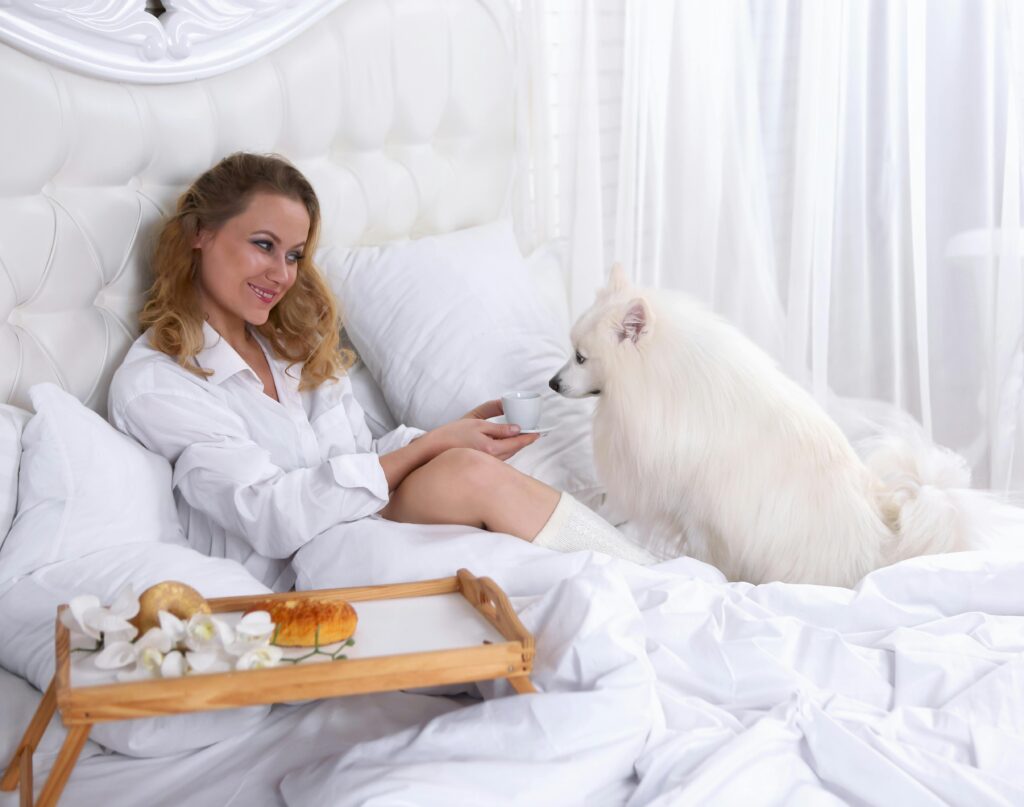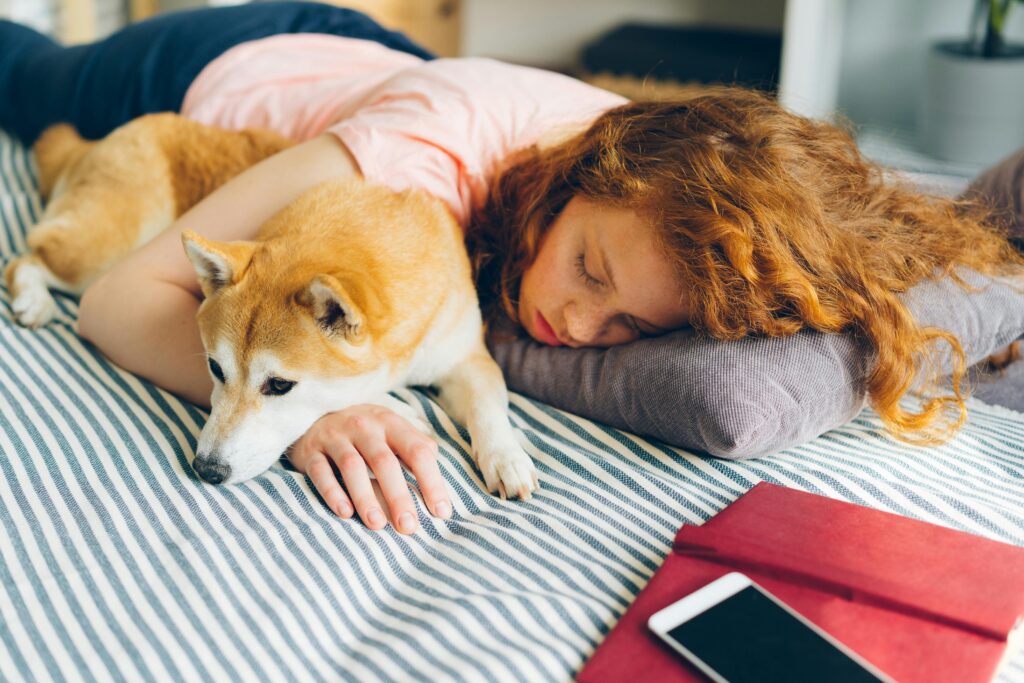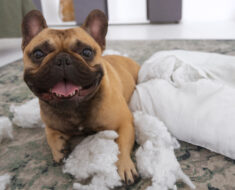Why does my dog bite down on his bed? It’s a common behavior among dogs that often leaves pet owners puzzled.
Could it be discomfort, anxiety, or simply a natural instinct? Understanding the reasons behind this behavior is crucial for ensuring your furry friend’s well-being.
In short, dogs may bite down on their beds due to teething, discomfort, anxiety, or even boredom.
This seemingly innocuous behavior can indicate underlying issues that need attention. Exploring these reasons can lead to effective solutions and a happier pup.
Curious to learn more about why your dog exhibits this behavior? Our expert, Dr. Canine Behavior, delves deeper into the psychology behind canine bed-biting and offers practical tips for addressing it.
Let’s uncover the secrets behind this quirky habit together!
Why does my dog bite down on his bed?
Why Do Dogs Destroy Their Beds?
Dogs may destroy their beds due to various reasons, including boredom, anxiety, seeking attention, or instinctual behavior.
Boredom is a common factor, especially in breeds that are highly active or intelligent and require mental stimulation.
When left alone for long periods without adequate entertainment, dogs may resort to destructive chewing as a way to relieve boredom.
Anxiety or stress can also lead to destructive behavior, as dogs may chew or tear apart their beds as a coping mechanism.
Seeking attention is another possible reason, especially if the dog has learned that destructive behavior results in attention from their owner, even if it’s negative.
Here, how to sew a dog bed cover.
Additionally, some dogs may have a natural instinct to “den” or create a comfortable nesting spot, which can involve rearranging or tearing up bedding materials.
Providing ample exercise, mental stimulation, chew toys, and a comfortable, safe space can help address and prevent destructive behavior in dogs.
Consulting with a veterinarian or animal behaviorist can also offer personalized strategies to manage this issue.
Why Do Dogs Scratch Their Beds?
Dogs scratch their beds for several reasons, most of which are natural behaviors rooted in their instincts and needs.
One common reason is to create a comfortable sleeping spot.
By scratching at their bed, dogs may be trying to adjust the bedding or make it more suitable for rest by fluffing it up or shaping it to their liking.
Another reason dogs scratch their beds is to mark their territory with their scent.
Dogs have scent glands in their paws, and scratching their beds can help them spread their unique scent, signaling ownership of the space and providing a sense of security.
Additionally, scratching can be a self-soothing behavior for dogs, akin to kneading or nesting. It may help them relax and feel more settled before lying down to rest.
Overall, scratching their beds is a natural and instinctual behavior for dogs that serves various purposes related to comfort, security, and territorial marking.
Why Do Dogs Dig In Their Beds?
Dogs dig in their beds for instinctual reasons such as creating a comfortable sleeping area or den.
This behavior is rooted in their ancestry, where wild dogs would dig to create a safe and warm spot for rest.
Here, why does my dog hang his head off the bed?
Digging can also be a way for dogs to relieve stress, anxiety, or excess energy. Additionally, some dogs may dig in their beds as a way to mark their territory with their scent.
Providing a comfortable and secure sleeping environment, regular exercise, and mental stimulation can help minimize excessive digging behavior in dogs.
9 Reasons why does my dog bite down on his bed
1. Natural Instincts and Teething
Dogs, especially puppies, explore their world through their mouths.
Biting down on their bed may be a form of play or a way to relieve discomfort during teething. It’s a natural behavior as they learn about textures and sensations.
2. Boredom and Lack of Stimulation
When dogs lack mental and physical stimulation, they may resort to biting their beds out of boredom.
This behavior can signify a need for more playtime, walks, or interactive toys to keep them engaged and prevent destructive habits.
3. Anxiety and Stress
Anxiety or stress can manifest in various ways, including destructive chewing.
Dogs may bite their beds as a coping mechanism when they feel anxious or insecure.
Addressing the underlying causes of anxiety through training, routine, and a calm environment can help alleviate this behavior.
4. Comfort and Nesting Instinct
Dogs have a natural instinct to create a comfortable nesting spot.
Biting down on their bed may be a way to adjust the bedding to their liking, make it softer, or create a cozy den-like space where they feel safe and secure.
Here, how to stop my dog from peeing on my bed?
5. Seeking Attention
Some dogs learn that engaging in destructive behaviors like biting their beds can get them attention from their owners, even if it’s negative.
This behavior can be a way for them to communicate their needs or desire for interaction.
6. Lack of Proper Chew Toys
Insufficient access to appropriate chew toys can lead dogs to bite their beds as an alternative way to relieve teething discomfort or satisfy their chewing instincts. Providing a variety of safe chew toys can redirect this behavior.
7. Uncomfortable Sleeping Environment
If a dog’s bed is uncomfortable or doesn’t meet their needs, they may bite it as a way to communicate their discomfort. Ensuring the bed is the right size, supportive, and free from potential irritants can prevent this behavior.
8. Health Issues
In some cases, dogs may bite their beds due to underlying health issues such as dental problems or skin irritation. A thorough checkup by a veterinarian can rule out any medical causes for the behavior.
9. Scent Marking
Dogs have scent glands in their mouths, and biting their beds can be a way to mark their territory with their scent.
This behavior is more common in unneutered males but can occur in any dog as a natural instinct to claim their space.
Understanding the reasons behind a dog’s behavior is crucial in addressing and managing it effectively.
Implementing appropriate training, providing mental and physical stimulation, ensuring comfort, and seeking veterinary advice when needed can help curb bed-biting behavior in dogs.
How To Stop Dogs From Destroying Their Beds
To stop dogs from destroying their beds, several strategies can be implemented:

- Provide Appropriate Chew Toys: Offer a variety of safe and durable chew toys to redirect their chewing behavior towards acceptable items.
- Regular Exercise: Ensure dogs receive enough physical exercise to release pent-up energy and reduce boredom-induced destructive tendencies.
- Mental Stimulation: Engage dogs with interactive toys, puzzles, or training sessions to keep their minds active and prevent boredom.
- Comfortable Sleeping Area: Ensure the bed is comfortable, the right size, and free from potential irritants to encourage them to use it appropriately.
- Positive Reinforcement: Reward desired behaviors such as using the bed calmly and avoiding destructive chewing with treats, praise, or playtime.
- Training and Consistency: Use training techniques like redirecting attention, teaching “leave it” commands, and reinforcing boundaries consistently to discourage destructive behavior.
- Address Underlying Issues: If destructive behavior persists, consult with a veterinarian or animal behaviorist to rule out medical issues or develop a personalized behavior modification plan.
By implementing these strategies consistently and providing a conducive environment, dogs can learn appropriate behaviors and avoid destroying their beds
Here, why does my dog roll around on my bed?
Why do dogs chew their bedding and crate liner?
How can you stop them from doing it?
To stop dogs from chewing their bedding and crate liners, several strategies can be effective:
- Provide Appropriate Chew Toys: Offer a variety of safe and durable chew toys that are specifically designed for dogs. Encourage them to chew on these toys instead of their bedding or crate liners.
- Supervise and Redirect: Keep a close eye on your dog when they are in their crate or around their bedding. If you catch them chewing, calmly redirect their attention to a chew toy and praise them when they use it.
- Increase Exercise and Mental Stimulation: Ensure your dog gets enough physical exercise and mental stimulation throughout the day. A tired and mentally stimulated dog is less likely to engage in destructive chewing out of boredom or excess energy.
- Use Bitter Sprays or Deterrents: Apply bitter-tasting sprays or use deterrents designed to discourage chewing on specific items. These products create an unpleasant taste or smell that can deter dogs from chewing on their bedding or crate liners.
- Address Anxiety and Stress: If your dog chews due to anxiety or stress, work on reducing their anxiety through positive reinforcement training, desensitization, and creating a calm and comfortable environment.
- Consult a Professional: If the chewing behavior persists despite your efforts, consider seeking advice from a veterinarian or certified animal behaviorist. They can assess the underlying causes and provide personalized strategies to address and manage the behavior effectively.
Here, why is my dog suddenly sleeping under the bed?
My dog sleeps in my bed and he growls at me if I accidentally touch him with my foot while sleep. He gets quite vicious. Is there any way I can correct this behavior without having to make him stop sleeping in my bed?
Yes, you can correct this behavior by implementing positive reinforcement training.
Start by teaching your dog that being touched gently while sleeping is not a threat.
During the day, gently touch your dog’s body, gradually increasing the pressure to mimic accidental contact while sleeping.
Reward calm behavior with treats and praise. Additionally, use a cue like “gentle” or “easy” when touching your dog to associate the touch with a positive command.
Consistency and patience are key to modifying this behavior without prohibiting your dog from sleeping in your bed.
How can I stop my dog from barking incessantly when I come home?
To address incessant barking when you come home, start by ignoring your dog’s barking upon arrival.
Wait for a moment of quiet and then greet them calmly and reward them with attention. Practice this consistently to teach your dog that quiet behavior is rewarded, while barking is not.
Additionally, ensure your dog gets enough exercise and mental stimulation throughout the day to reduce anxiety and excess energy.
Consider providing interactive toys or puzzles to keep them engaged while you’re away.
Gradually, your dog should learn that calm behavior results in positive interactions, reducing the urge to bark excessively when you return home.
How do I stop my dog from barking at every little sound?
To stop your dog from barking at every little sound, start by identifying triggers and desensitizing them.
Play recorded sounds at a low volume, gradually increasing it while rewarding calm behavior. Use commands like “quiet” or “enough” and reward compliance.

Provide mental and physical stimulation to prevent boredom-induced barking. Create a calm environment with background noise to minimize sensitivity to external sounds.
Consistency is crucial; avoid yelling or punishment, as it can reinforce barking. Consult a professional trainer for personalized strategies if the barking persists despite efforts.
What Should I Look For in a Dog Bed
When choosing a dog bed, consider these factors: Here, how to keep dog fro digging in flower bed?
- Size: Ensure the bed is large enough for your dog to stretch out comfortably.
- Material: Opt for durable, washable materials that provide comfort and support.
- Support: Look for beds with adequate cushioning or orthopedic support for older or arthritic dogs.
- Design: Choose a bed with a design that suits your dog’s sleeping preferences, such as a bolstered edge for nesting.
- Easy Maintenance: Select a bed with a removable cover for easy cleaning.
- Safety: Avoid beds with small parts or materials your dog could ingest.
- Budget: Balance quality and affordability to find the best bed for your dog’s needs.
Related faq’s
Why does my dog nibble blankets or pillows? He never tears or damages them, just nibbles.
Dogs may nibble on blankets or pillows for several reasons, primarily stemming from instinctive behaviors and comfort-seeking tendencies.
- Exploration and Play: Dogs use their mouths to explore and interact with objects, similar to how puppies explore their world through chewing.
- Comfort and Security: Nibbling on soft items like blankets or pillows can provide a sense of comfort and security, especially if they associate these items with relaxation or their sleeping area.
- Soothing Behavior: Some dogs find the act of nibbling soothing, akin to humans using stress-relief toys or blankets for comfort.
- Teething and Oral Stimulation: For puppies or dogs going through teething phases, nibbling can help alleviate discomfort and provide oral stimulation.
- Attention-Seeking: In some cases, dogs may nibble on blankets or pillows as a way to seek attention or engage their owners in play.
It’s important to differentiate between playful nibbling and destructive chewing.
As long as your dog isn’t damaging the items and seems content, it’s likely a harmless behavior.
Providing appropriate chew toys and engaging in regular play can help redirect this behavior if needed.
What causes my dog to chew my bed?
Several factors can cause dogs to chew on beds:
- Teething: Puppies may chew to relieve teething discomfort.
- Boredom: Lack of mental and physical stimulation can lead to destructive chewing.
- Anxiety: Stress or separation anxiety can manifest as chewing behavior.
- Exploration: Dogs may chew out of curiosity or to investigate new textures.
- Comfort: Adjusting bedding for a more comfortable sleeping spot.
- Attention-seeking: Chewing may garner attention from owners, even if negative.
Understanding the underlying cause, providing appropriate chew toys, mental stimulation, and addressing anxiety can help redirect this behavior.
Why is my dog biting in bed all of a sudden?
Sudden biting in bed can be due to various reasons:
- Pain or Discomfort: Dogs may bite due to underlying health issues or discomfort.
- Anxiety or Stress: Changes in the environment or routine can trigger anxiety-induced biting.
- Fear or Startle: Dogs may react aggressively if startled or feeling threatened.
- Territorial Behavior: Protecting their sleeping area or belongings can lead to biting.
- Hormonal Changes: Unneutered males may exhibit territorial or aggressive behavior.
Consulting a veterinarian can help rule out health concerns, while positive reinforcement training and addressing triggers can help modify this sudden biting behavior.
Why does my dog nibble on blankets? How do I handle such a situation?
Dogs may nibble on blankets due to various reasons such as comfort, playfulness, or exploration. It can also mimic behaviors seen during nursing or teething stages.
To handle this situation, provide appropriate chew toys as an alternative and encourage positive chewing behavior. Redirect their attention when they nibble on blankets and reward them for chewing on toys.
Ensure they get enough exercise and mental stimulation to reduce boredom.
If the nibbling persists excessively or causes damage, consult with a veterinarian or animal behaviorist for further guidance and training strategies.
Why do dogs chew their bedding and crate liner? How can you stop them from doing it?
Dogs may chew their bedding and crate liners for several reasons, ranging from teething and boredom to anxiety or a lack of appropriate outlets for their chewing instincts.
Teething and Exploration
Puppies, especially during teething, may chew on various objects, including bedding and crate liners, to relieve discomfort and explore textures. This behavior is natural and typically decreases as they mature.
Boredom and Lack of Stimulation
Dogs require mental and physical stimulation. When bored or understimulated, they may resort to chewing as a way to alleviate boredom or excess energy. Without appropriate outlets for play and exercise, they may target bedding and crate liners.
Anxiety and Stress
Anxiety or stress can lead dogs to engage in destructive chewing behaviors. This can occur when they feel anxious about being confined in a crate or experience separation anxiety. Chewing can be a coping mechanism for such emotions.
Ways to Stop Dogs from Chewing Bedding and Crate Liner
Several strategies can help prevent dogs from chewing their bedding and crate liners:
1. Provide Appropriate Chew Toys
Offer a variety of safe and durable chew toys specifically designed for dogs. Encourage them to chew on these toys by making them more appealing than the bedding or crate liner.
2. Increase Exercise and Mental Stimulation
Ensure your dog gets enough physical exercise and mental stimulation throughout the day. This can include walks, interactive play sessions, and training activities. A tired and mentally engaged dog is less likely to engage in destructive chewing out of boredom or excess energy.
3. Supervise and Redirect
Keep a close eye on your dog when they are near their bedding or crate. If you catch them chewing, calmly redirect their attention to a chew toy or another appropriate activity. Consistently reinforce positive chewing behaviors.
4. Use Bitter Sprays or Deterrents
Apply bitter-tasting sprays or use deterrent products designed to discourage chewing on specific items like bedding or crate liners. These products create an unpleasant taste or smell, deterring dogs from engaging in destructive chewing.
5. Address Underlying Issues
If chewing persists despite interventions, consider if there are underlying issues such as anxiety or medical conditions contributing to the behavior. Consult with a veterinarian or animal behaviorist to address these issues and develop a tailored behavior modification plan.
6. Reinforce Positive Behavior
Praise and reward your dog when they engage in appropriate chewing behavior, such as chewing on their toys. Positive reinforcement helps reinforce desired behaviors and encourages dogs to repeat them.
By combining these strategies and remaining consistent in training and supervision, you can effectively prevent dogs from chewing their bedding and crate liners while promoting positive chewing habits.
Why is my dog biting down on his bed?
Dogs may bite down on their beds for various reasons.
Firstly, it could be a natural instinct related to teething or exploration, especially common in puppies.
Dogs use their mouths to investigate textures and relieve teething discomfort.
Secondly, boredom can lead to this behavior. When dogs lack mental and physical stimulation, they may resort to chewing as a way to alleviate boredom or excess energy.
Additionally, anxiety or stress can manifest in biting behavior. Dogs may chew their beds as a coping mechanism when they feel anxious or insecure, such as during changes in their environment or routine.
Furthermore, dogs might bite their beds to create a comfortable sleeping spot or nest, adjusting the bedding to their liking.
Observing your dog’s body language and environment can provide clues to the underlying reason for bed-biting behavior.
Providing appropriate chew toys, regular exercise, mental stimulation, and a comfortable, safe space can help address and redirect this behavior if necessary.
Consulting with a veterinarian or animal behaviorist can also offer valuable insights and guidance.
How do I stop my dog from chewing his bed?
To stop your dog from chewing his bed, follow these steps:
- Provide appropriate chew toys: Offer durable toys that are safe for chewing to redirect his chewing behavior.
- Increase exercise and mental stimulation: Ensure he gets enough physical activity and mental stimulation to prevent boredom-induced chewing.
- Supervise and redirect: Keep an eye on him and redirect his attention to toys or other activities whenever he starts chewing his bed.
- Use deterrents: Consider using bitter-tasting sprays or deterrent products on the bed to discourage chewing.
- Address underlying issues: If chewing persists, consult a veterinarian to rule out any medical or behavioral issues causing the behavior.
Why is my dog ripping up his bed?
Your dog may be ripping up his bed due to several reasons. Firstly, it could be an instinct to create a comfortable sleeping spot or nest, similar to how wild dogs would prepare their sleeping area.
Secondly, boredom or excess energy can lead to destructive behavior, including tearing up bedding.
Thirdly, anxiety or stress can manifest in destructive behaviors like ripping up bedding as a coping mechanism. Additionally, teething or exploration behaviors, especially in puppies, may contribute to this behavior.
Providing appropriate chew toys, mental stimulation, and addressing any underlying anxiety or boredom can help curb this destructive habit.
Why is my dog aggressive towards his bed?
Your dog may be aggressive towards his bed due to various reasons. Firstly, he might perceive the bed as a territorial possession, especially if he’s unneutered or if the bed has a strong scent associated with him.
Secondly, discomfort or pain can lead to aggression, such as if the bed is uncomfortable or if he’s experiencing health issues.
Thirdly, anxiety or stress can cause dogs to display aggression towards objects they associate with negative emotions.
It’s essential to assess the underlying cause, provide a comfortable and safe sleeping environment, and consult with a veterinarian or behaviorist for further guidance and support
Conclusion:
In conclusion, dogs often bite down on their beds as a natural instinct to relieve stress, anxiety, or boredom.
This behavior can also be a way for them to explore and manipulate their environment. Providing appropriate mental and physical stimulation can help reduce this behavior.






